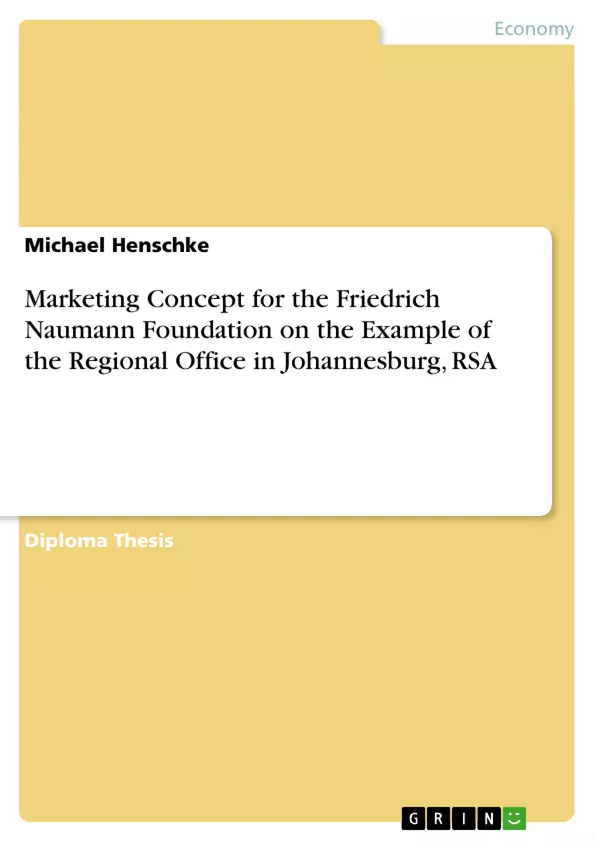As Philip Kotler wrote in his Principles of Marketing no book is the work only of the author,
it is also not only my thesis. Of course it was me who read the books, who asked the
questions, and who wrote the lines. But without the Friedrich Naumann Foundation, which
supported me right from the beginning in October 2001 when my scholarship started, with the
opportunities to do these marvellous internships in the Regional Offices of New Delhi, India,
and Johannesburg, RSA, I might have written about another subject or in another way with
other arguments.
Thanks to the pleasant and kind employees of the Friedrich Naumann Foundation, the liberal
partners of the Friedrich Naumann Foundation such as the Liberal Institute of India, the Free
Market Foundation of South Africa, the International Policy Network, and the members of the
Mont Pelerin Society. I wish to thank all of you for incredible talks, visions and the permanent
interchange of ideas. Finally, I would also like to thank Miss Demirtas and Miss Olayinka, Mr
Otto and Mr Knipping who helped correcting this thesis.
Inhaltsverzeichnis (Table of Contents)
- Part One - Preface
- Contents
- Index of Tables
- Acknowledgements
- Explanations
- Personal Motivation
- Part Two - Organisations
- Differences between Non-Governmental and Non-Profit Organisations
- What are Non-Profit Organisations?
- Problems with and Changes in Non-Profit Organisations
- What are Non-Governmental Organisations?
- Where are the Differences?
- Part Three Political Foundations
- Political Foundations in Germany
- Development and Function of Political Parties in Germany
- The Idea of Political Foundations
- Financing Situation
- Political Foundations Abroad
- Foundations in General
- Tasks and Objectives of Political Foundations in General
- In General
- More Specifically
- Konrad-Adenauer-Stiftung
- Friedrich-Ebert-Stiftung
- Hanns-Seidel-Stiftung
- Heinrich-Böll-Stiftung
- Rosa-Luxemburg-Stiftung
- Friedrich Naumann Stiftung
- Friedrich Naumann Foundation
- Historical Development
- The Liberal Idea and its Philosophy
- Today's Situation
- Tasks and Objectives of the FNF in General
- Tasks and Objectives of the FNF in Johannesburg, RSA
- Tasks
- Objectives
- The role and significance of non-profit and non-governmental organizations (NGOs)
- The historical development and philosophical underpinnings of the FNF
- The FNF's marketing strategies and their effectiveness in achieving its objectives
- The challenges and opportunities facing the FNF in Johannesburg
- The importance of a tailored marketing approach for NGOs in different contexts
- Part One - Preface: This section provides an introduction to the thesis, outlining its content, acknowledgements, and personal motivation.
- Part Two - Organisations: This part discusses the distinction between non-profit and non-governmental organizations, exploring their characteristics, challenges, and evolution.
- Part Three - Political Foundations: This section delves into the world of political foundations, examining their development in Germany, financing mechanisms, and the specific objectives of various foundations, including the FNF.
- Chapter 3.1 - Historical Development: This chapter outlines the historical evolution of the FNF, emphasizing its philosophical underpinnings and current situation.
- Chapter 3.2 - Tasks and Objectives of the FNF in General: This chapter explores the general tasks and objectives of the FNF, highlighting its mission and overarching goals.
- Chapter 3.3 - Tasks and Objectives of the FNF in Johannesburg, RSA: This chapter focuses on the specific tasks and objectives of the FNF in Johannesburg, South Africa, providing insights into its regional activities.
Zielsetzung und Themenschwerpunkte (Objectives and Key Themes)
This thesis examines the marketing concept of the Friedrich Naumann Foundation (FNF) in the context of its regional office in Johannesburg, South Africa. The study aims to analyze the foundation's activities and objectives, focusing on its marketing strategies and their effectiveness in promoting its mission.
Zusammenfassung der Kapitel (Chapter Summaries)
Schlüsselwörter (Keywords)
This thesis focuses on the marketing concept, non-profit organizations, NGOs, political foundations, Friedrich Naumann Foundation (FNF), liberal ideas, marketing strategies, Johannesburg, South Africa, regional office, mission, objectives, challenges, opportunities, and tailored marketing approach.
Frequently Asked Questions
What is the focus of the marketing concept for the Friedrich Naumann Foundation?
The thesis analyzes the foundation's marketing strategies, specifically focusing on its regional office in Johannesburg, South Africa, to promote liberal ideas.
How do NPOs and NGOs differ?
The study explores the characteristics and challenges of Non-Profit Organisations (NPOs) versus Non-Governmental Organisations (NGOs) and how these differences affect their operations.
How are political foundations in Germany financed?
The thesis explains the financing situation of German political foundations, which is largely based on public funding and tied to their role in political education.
What are the objectives of the FNF in Johannesburg?
The regional office aims to promote free-market principles, liberal philosophy, and democratic values through partnerships with local organizations.
Who are the partners of the Friedrich Naumann Foundation?
Partners include the Liberal Institute of India, the Free Market Foundation of South Africa, and the International Policy Network.
Why is marketing important for political foundations?
Effective marketing helps foundations reach their target audience, fulfill their educational mission, and maintain visibility on an international scale.
- Citation du texte
- Michael Henschke (Auteur), 2003, Marketing Concept for the Friedrich Naumann Foundation on the Example of the Regional Office in Johannesburg, RSA, Munich, GRIN Verlag, https://www.grin.com/document/15478



